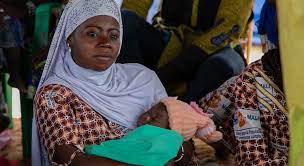
African women are 130 times more likely to die due to pregnancy or childbirth complications than women in Europe and Northern America, the UN sexual and reproductive health agency (UNFPA) said in a new report published on Wednesday.
Interwoven Lives, Threads of Hope: Ending inequalities in sexual and reproductive health and rights, reveals that more than half of all preventable maternal deaths occur in countries which are in a state of crisis or distress.
It highlights the role that racism, sexism and other forms of discrimination play in blocking progress on sexual and reproductive health issues.
Women and girls trapped in poverty are more likely to die prematurely due to lack of sufficient healthcare if they belong to minority groups or are trapped in a conflict setting, according to the findings.
"For sexual and reproductive health issues, the sad truth is that rather than all hands on deck and working together, there's kind of a polarization dialogue, a divisive type of attitude, and in a way, a 'second class citizen' attitude for the rights of women and girls," UNFPA Executive Director Natalia Kanem said in an interview with UN News.
Overall, there have been significant advances in sexual and reproductive health it became a global sustainable development priority three decades ago.
“In the space of a generation, we have reduced the unintended pregnancy rate by nearly one fifth, lowered the maternal death rate by one third, and secured laws against domestic violence in more than 160 countries,” UNFPA Executive Director said, launching the report.
Stalled progress
But progress is slowing down or stalled in several key areas. In a world where a quarter of women cannot say no to sex with their partner and nearly one in 10 have no say over contraception, 800 women die every day giving birth – a disturbing figure that has remained unchanged since 2016.
Nearly 500 of those preventable deaths per day are happening in countries living through humanitarian crises and conflicts.
“The world made zero progress in saving women from preventable deaths in pregnancy and childbirth,” said Ms. Kanem, adding that for the first time, data was collected on whether women's bodily autonomy is strengthening over time.
In 40 per cent of countries where information is available, autonomy is weakening due to an inability to reach “those furthest behind”, she added.
There is a clear disparity between the global North and South, West and East, when it comes to contraceptives, safe birth services, respectful maternity care, and other essential services, the report documents.
Pockets of inequality
Yet, even within those regions there are “pockets of inequality”, the report underscores. Women of African descent in the Americas face higher maternal mortality rates compared to white women, which is especially evident in the United States where it's three times the national average.
Indigenous and ethnic minorities also face elevated risks related to pregnancy and childbirth.
Within Europe, in Albania, for example, over 90 per cent of Roma women from the most marginalized socioeconomic groups had serious problems in accessing healthcare compared with only five per cent of ethnic Albanian women from the most privileged strata.
Additionally, women with disabilities are up to ten times more likely to experience gender-based violence, and individuals of diverse sexual orientation and gender expression encounter significant violence and barriers to care.
No ‘one-size-fits-all’ solutions
The report highlights the importance of tailoring programmes to the needs of communities and empowering women and girls to craft and implement innovative solutions.
It also calculates that if additional $79 billion are invested in low and middle-income countries by 2030, 400 million unplanned pregnancies could be averted, a million lives saved and $660 billion in economic benefits could be generated.
“Women are half of society and women are stepping up to claim their full rights. We believe that the ability of human society to prosper really depends on looking at who's vulnerable,” Ms. Kanem told UN News.
The ability to secure reproductive health rights, the UNFPA Executive Director believes, is another major challenge.
“It is indeed the responsibility of men to be champions of women's reproductive rights, of everyone's reproductive rights,” Ms. Kanem said.
Source: UN News
https://news.un.org/en/story/2024/04/1148621
 FR
FR EN
EN AR
AR








